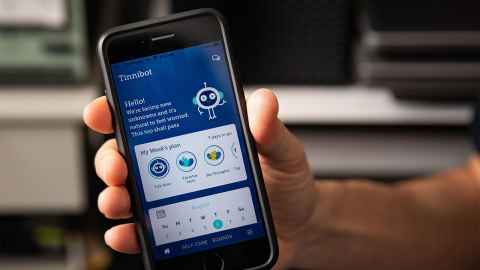Chatbot as therapy for tinnitus – study launch
11 August 2020
Chatbot technology that offers therapy for tinnitus sufferers via a mobile device such as a smartphone will be trialled at the University of Auckland.

Chatbot technology that offers therapy for tinnitus sufferers via a mobile device such as a smartphone will be trialled at the University of Auckland.
Researchers are recruiting participants for the ‘Tinnibot’ study which is aimed at helping those who suffer from a hearing disorder that affects around one in ten New Zealanders and more than 700 million people worldwide.
Tinnitus is usually experienced as a ringing in the ears but sufferers report a range of noises including buzzing, clicking and even the sound of cicadas. Severity varies: sounds can be continuous or intermittent but the condition is linked to serious mental health effects including depression, anxiety and insomnia. Currently there is no cure.
But as online technologies and devices such as smartphones change the way health care is delivered, Dr Fabrice Bardy from the University of Auckland’s School of Psychology says it has created new opportunities to treat tinnitus and to study which treatments work best.
Tinnibot is a chatbot programme which uses Cognitive Behavioural Therapy (CBT), proven to be effective in the treatment of tinnitus but usually only available through one-on-one sessions which can be expensive and involve long wait times.

The chatbot’s software interface delivers CBT designed for an individual’s needs direct to their mobile, conducting an automated and interactive text conversation designed to help people regulate their thoughts by focusing on positive thoughts and challenging negative ones.
The interface incorporates a sound therapy library which has proved to be effective tinnitus therapy, particularly for those who have trouble sleeping. It works by using noise at just the right volume to drown out the sounds tinnitus can produce.
Dr Bardy describes Tinnibot as like having a tinnitus expert in your pocket.
“This chatbot interface is the first one designed specifically for the treatment of tinnitus, a tool that offers direct therapy and support which is convenient and affordable,” he says.
“It will help people better understand their condition and to manage symptoms, give them a sense of being in control and a confidence boost because that’s an important part of successful treatment.”
Participants in the research will be split into two cohorts with one using Tinnibot only and the other using Tinnibot as well as video counselling with a psychologist. The aim is to see which treatment is more effective.
If you have been bothered with tinnitus for over three months and if you are interested in participating in the study, contact Dr Bardy for more information.
Media contact
Anne Beston | Media adviser
DDI 09 923 3258
Mob 021 970 089
Email a.beston@auckland.ac.nz